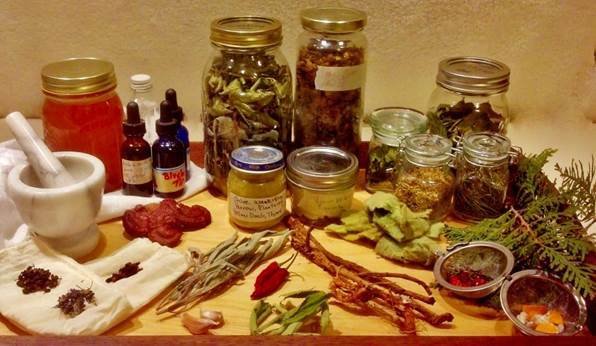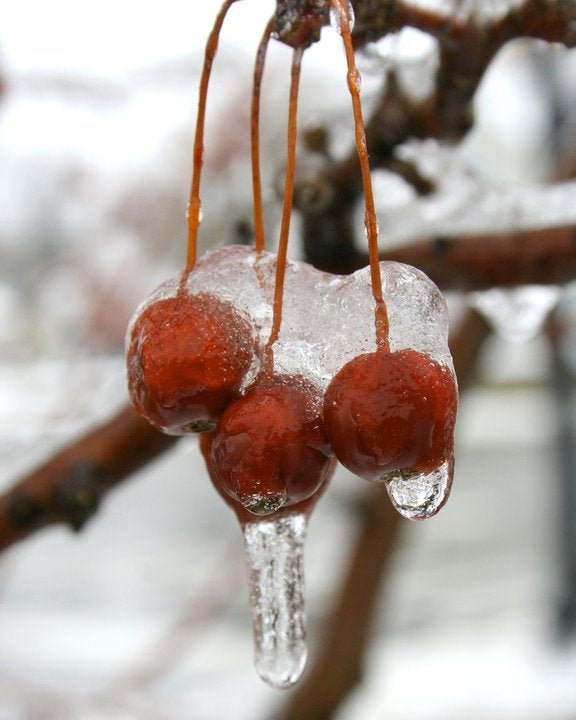
Events

Edible and Medicinal Plant Walk (Copy)
Plant walks are an excellent learning opportunities for those with beginning to intermediate foraging skills, and for anyone wishing to increase their knowledge of the local flora. Our discussion will include information about identification, methods of harvest, preparation, and use. We will explore the area and chose around 20-25 edible, medicinal, or otherwise useful plants and mushrooms to focus on.

Spring Mushroom Camp
This camp is designed to be a "mushroom intensive" experience. We will start with an introduction to the basic anatomy, physiology, and ecology of mushrooms. Then we will discuss the major groups of fungi and show you the characteristics used to classify and identify some of the more common groups of mushrooms in our area, with a focus on those that are edible. You will learn about growing mushrooms, and start your own mushroom garden box to take home. You will also get to sample a variety of wild mushroom with mushroom dishes at every meal. And, of course, we will spend plenty of time searching for and studying mushrooms in the woods.

Edible and Medicinal Plant Walk (Copy) (Copy)
Plant walks are an excellent learning opportunities for those with beginning to intermediate foraging skills, and for anyone wishing to increase their knowledge of the local flora. Our discussion will include information about identification, methods of harvest, preparation, and use. We will explore the area and chose around 20-25 edible, medicinal, or otherwise useful plants and mushrooms to focus on.

Edible and Medicinal Plant Walk (Copy)
Plant walks are an excellent learning opportunities for those with beginning to intermediate foraging skills, and for anyone wishing to increase their knowledge of the local flora. Our discussion will include information about identification, methods of harvest, preparation, and use. We will explore the area and chose around 20-25 edible, medicinal, or otherwise useful plants and mushrooms to focus on.

Edible and Medicinal Plant Walk (Copy) (Copy)
Plant walks are an excellent learning opportunities for those with beginning to intermediate foraging skills, and for anyone wishing to increase their knowledge of the local flora. Our discussion will include information about identification, methods of harvest, preparation, and use. We will explore the area and chose around 20-25 edible, medicinal, or otherwise useful plants and mushrooms to focus on.

Edible and Medicinal Plant Walk (Copy)
Plant walks are an excellent learning opportunities for those with beginning to intermediate foraging skills, and for anyone wishing to increase their knowledge of the local flora. Our discussion will include information about identification, methods of harvest, preparation, and use. We will explore the area and chose around 20-25 edible, medicinal, or otherwise useful plants and mushrooms to focus on.

Edible and Medicinal Plant Walk (Copy)
Plant walks are an excellent learning opportunities for those with beginning to intermediate foraging skills, and for anyone wishing to increase their knowledge of the local flora. Our discussion will include information about identification, methods of harvest, preparation, and use. We will explore the area and chose around 20-25 edible, medicinal, or otherwise useful plants and mushrooms to focus on.

Edible and Medicinal Plant Walk
Plant walks are an excellent learning opportunities for those with beginning to intermediate foraging skills, and for anyone wishing to increase their knowledge of the local flora. Our discussion will include information about identification, methods of harvest, preparation, and use. We will explore the area and chose around 20-25 edible, medicinal, or otherwise useful plants and mushrooms to focus on.

Wild Pancake Brunch
Flours are powders made from various plant parts that are typically used in baking. Wild flours can be made from many different plants. In this class, you will learn about 5 of them: Chestnut, Acorn, Cattail, Dock, and Wild Rice. All of these plants were staple food sources for countless generations of humans, and each of them is processed in a different way. We will talk about those processes and the various steps involved in preparing each of them to be ground into flour. And we will make, and taste test, pancakes so that you can see how the various flours work in a recipe and taste test the results. Along with a variety of both sweet and savory wild pancake toppings for you to explore.
Wild flours do not have gluten and cannot simply replace wheat flour in most recipes. Typically wild flours are used in combination with wheat flour. So our pancakes will contain wheat flour as well as the wild flours. If you have a gluten allergy, please indicate on the form when you register so that I know how much gluten-free pancake mix I need to have.
March 23, 10-1, at Tantre Farm: 2510 Hayes Rd, Chelsea, MI 48118

Foraged Medicine Cabinet
What would your medicine cabinet would look like if you replaced your over the counter stuff with herbal remedies? Now is your chance to find out! First, we will discuss roughly 15 wild plants that can be used to treat most minor ailments. You will learn about the healing properties of the plants, as well as the techniques for extracting and preserving their healing qualities. This part will be sort of like a lecture, so bring a notebook to take notes. Then we will spend the rest of the afternoon in the kitchen, using lawn weeds and common garden herbs to produce home remedies that can take the place of over the counter medicines. You will get to work hands on to make First Aid Salve, Muscle Ache Balm, Headache Tincture, Cough and Cold Syrup, Tummy Tea, Sleepy Tea, Tooth Tincture, and Eye Relief Compress. Everyone will get to take their products home with them. This class will not include a plant walk. All plants will be pre-harvested so that we can focus on learning the techniques.
3/15, 2-5pm, Irish Hills- 900 Twin Lake, Tipton, MI 49287

Foraged Medicine Cabinet
What would your medicine cabinet would look like if you replaced your over the counter stuff with herbal remedies? Now is your chance to find out! First, we will discuss roughly 15 wild plants that can be used to treat most minor ailments. You will learn about the healing properties of the plants, as well as the techniques for extracting and preserving their healing qualities. This part will be sort of like a lecture, so bring a notebook to take notes. Then we will spend the rest of the afternoon in the kitchen, using lawn weeds and common garden herbs to produce home remedies that can take the place of over the counter medicines. You will get to work hands on to make First Aid Salve, Muscle Ache Balm, Headache Tincture, Cough and Cold Syrup, Tummy Tea, Sleepy Tea, Tooth Tincture, and Eye Relief Compress. Everyone will get to take their products home with them. This class will not include a plant walk. All plants will be pre-harvested so that we can focus on learning the techniques.
2/22, 2-5pm, Tantre Farm- 2510 Hayes Rd, Chelsea, MI 48118

Winter Plant ID
2/8, noon-1:30pm: Tree ID is important to finding herbs and mushrooms, as well as the trees themselves. If you can only ID trees with their leaves on, you can't scout during the winter. But if you can ID them without their leaves, you can scout all year round. To ID trees in the winter, you need to look at characteristics other than their leaves. In this class we will look closely at several different trees and shrubs and discuss how to identify them based on characteristics such as bark, branching pattern, and winter buds.
2/8, 1:30-3:00pm: The Non-Woody Plant ID class will focus on identifying herbaceous plants. There are several plants (many of them edible) that remain green all winter, even under the snow. So we will spend some time talking about those. But we will also spend time learning to ID dead plants. Why? Because the "skeletons" of dead herbaceous plants can tell you where to look for roots and where you should look for things during the growing season. You would be surprised at how much you can ID in the winter.
These classes are outdoors. Dress for the weather.

Wild Pancake Brunch
Flours are powders made from various plant parts that are typically used in baking. Wild flours can be made from many different plants. In this class, you will learn about 5 of them: Chestnut, Acorn, Cattail, Dock, and Wild Rice. All of these plants were staple food sources for countless generations of humans, and each of them is processed in a different way. We will talk about those processes and the various steps involved in preparing each of them to be ground into flour. And we will make, and taste test, pancakes so that you can see how the various flours work in a recipe and taste test the results. Along with a variety of both sweet and savory wild pancake toppings for you to explore.
Wild flours do not have gluten and cannot simply replace wheat flour in most recipes. Typically wild flours are used in combination with wheat flour. So our pancakes will contain wheat flour as well as the wild flours. If you have a gluten allergy, please indicate on the form when you register so that I know how much gluten-free pancake mix I need to have.
January 26, 10-1, in the Irish Hills: 900 Twin Lake, Tipton, MI 49287


Black Friday Plant Walk
Plant walks are excellent learning opportunities for those with beginning to intermediate foraging skills and for anyone wishing to increase their knowledge of the local flora. Our discussion will include information about identification, methods of harvest, preparation, and use. We will explore the area and choose around 20-25 edible, medicinal, or otherwise useful plants and mushrooms to focus on.
Kids under 12 are free with paid adults. Walks are almost never canceled due to weather (one time in 12 years), so dress accordingly. We will be mostly on trails, no need to dress for bushwhacking. You may want to bring a notebook, camera, and water. No other gear is required.